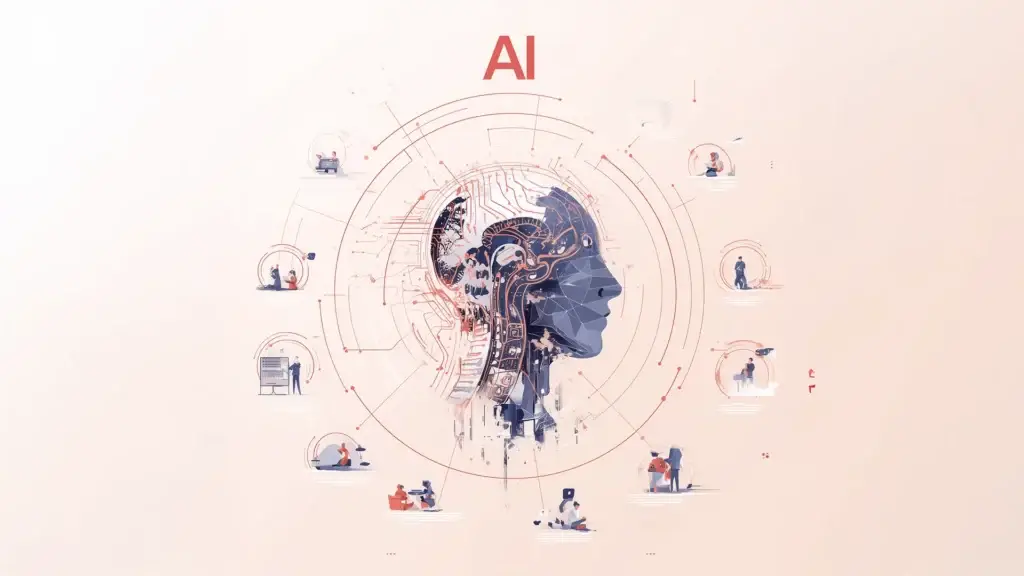The rise of sophisticated AI writing tools has sparked intense debate among digital marketers: Is AI-generated content good for SEO? At Incredible Roots, we’re frequently asked this question by clients looking to scale their content production while maintaining search visibility. The answer, like most things in digital marketing, is nuanced and continues to evolve alongside both AI capabilities and search engine algorithms.
The Current State of AI Content and Search Engines
Let’s address the elephant in the room first: Google has officially stated that AI-generated content isn’t inherently against their guidelines. What matters is the quality and value of the content, not whether it was written by a human or a machine.
According to Google’s Search Advocate John Mueller: “Our focus is on the quality of content rather than how content is produced. Using automation—including AI—to generate content with the primary purpose of manipulating ranking in search results is a violation of our spam policies.”
This stance marks a significant shift from earlier concerns about AI content being categorically flagged as “automatically generated content” under Google’s webmaster guidelines. The evolution reflects a growing recognition that AI tools, when used thoughtfully, can produce valuable content that genuinely serves user needs.
The SEO Benefits of AI-Generated Content
When implemented strategically, AI can enhance several aspects of your SEO content strategy:
1. Content Scaling with Consistency
One of the most compelling advantages of AI content tools is their ability to produce content at scale while maintaining consistent quality. For organizations managing large websites with hundreds or thousands of pages, AI can create foundational content across numerous topics within your niche, maintain consistent brand voice and terminology across all content, generate location-specific content variations without repetitive manual work, and update multiple pieces simultaneously when information changes.
This scaling capability allows businesses to build comprehensive topic coverage that signals relevance and authority to search engines.
2. Enhanced Research Efficiency
AI tools excel at gathering and synthesizing information, dramatically accelerating the research phase of content creation. They can analyze competitive content to identify coverage gaps, summarize key points from multiple sources, identify relevant statistics and source material, and suggest comprehensive subtopics to include.
This research efficiency enables content teams to spend less time on initial information gathering and more time adding unique insights and expertise.
3. Data-Informed Optimization
Advanced AI writing tools can leverage SEO data to optimize content structure. They excel at suggesting semantically related terms to include, recommending optimal content length based on competitive analysis, creating schema-friendly formatting, and generating meta descriptions and title tag variations.
These optimization capabilities help ensure content is technically sound from an SEO perspective without requiring extensive manual tweaking.
4. Improved Content Freshness
Search engines value regularly updated content. AI tools can efficiently identify outdated content across your site, update statistics and references, expand existing content with new relevant sections, and refresh examples and applications.
This systematic approach to content freshness can improve overall site quality signals and help maintain rankings for important pages.
The SEO Risks of Over-Reliance on AI Content
Despite these benefits, depending too heavily on AI-generated content carries significant SEO risks:
1. Lack of Original Insights and Expertise
The most sophisticated AI models train on existing content, meaning they excel at synthesizing and reformulating information but struggle with generating truly original insights. This limitation creates several potential issues. Content often feels generic rather than authoritative. Industry-specific nuances that only practitioners would know are frequently missing. There’s an inability to share unique perspectives that differentiate your brand. And perhaps most concerning, there’s potential for factual errors in specialized topics.
Search engines increasingly reward demonstrated expertise, making this limitation particularly problematic for topics in YMYL (Your Money, Your Life) categories like health, finance, and legal advice.
2. Potential Content Duplication Issues
AI tools trained on similar data sources may generate content with substantial similarities across different websites. This convergence can lead to multiple sites publishing nearly identical perspectives, similar structural approaches to topics, common examples and reference points, and standardized conclusions and recommendations.
While not technically duplicate content, this homogenization can make it difficult for any single piece to stand out as exceptionally valuable in search results.
3. Missing Emotional Intelligence and Audience Connection
Current AI models lack genuine emotional intelligence and struggle to connect with readers on a personal level, understand cultural nuances and sensitivities, tell authentic stories that resonate emotionally, and adapt tone appropriately for sensitive subjects.
This emotional disconnect can negatively impact engagement metrics like time on page, bounce rate, and return visits—factors that increasingly influence search rankings.
4. Potential Algorithm Adjustments
While search engines currently focus on content quality rather than creation method, future algorithm updates could potentially become more sophisticated at identifying and potentially devaluing certain patterns common in AI-generated content. These include predictable article structures, certain linguistic patterns and word choices, lack of personal perspective or lived experience, and generic handling of nuanced topics.
Companies over-indexing on fully AI-generated content could be vulnerable to such algorithm shifts.
Finding the Right Human-AI Balance for SEO Success
Based on our experience working with clients across various industries, we’ve found that the most effective approach uses AI as a powerful collaboration tool rather than a replacement for human expertise. Here’s our recommended framework for balancing AI efficiency with the human elements search engines reward:
1. Strategic Planning: Human-Led
Keep the strategic aspects of content planning firmly in human hands. This includes identifying content opportunities based on business goals, understanding audience needs at a deep level, developing unique perspectives and approaches, and establishing the brand voice and positioning.
No AI tool can replace the strategic thinking that connects content to business objectives and audience needs.
2. Research and Structuring: AI-Assisted
Leverage AI tools to accelerate the research and structuring phase. AI excels at gathering background information and statistics, analyzing competitive content for gaps, creating comprehensive outlines, and identifying relevant keywords and related terms.
This approach combines AI efficiency with human direction, ensuring thorough topic coverage while maintaining strategic alignment.
3. Initial Draft Creation: Flexible Approach
Adapt your approach to initial drafting based on content type.
For foundational, informational content (like product descriptions or basic how-to guides), AI can often generate solid first drafts, cover standard information comprehensively, create consistent formatting and structure, and ensure SEO best practices are followed.
For thought leadership or expert content, human writers should share unique perspectives and insights, incorporate proprietary information, provide authentic examples from experience, and add nuance to complex topics.
This flexibility allows you to use AI where it excels while preserving human input where it adds the most value.
4. Editing and Enhancement: Human Expertise
Always apply human editing to AI-generated content to verify factual accuracy, add brand-specific insights and examples, inject appropriate emotional elements, ensure authentic voice and perspective, and insert proprietary data or unique research.
This human enhancement layer transforms serviceable AI content into genuinely valuable material that both users and search engines will reward.
5. Technical Optimization: AI-Supported
Use AI tools to handle technical SEO elements like schema markup suggestions, meta description variations, heading structure recommendations, and internal linking opportunities.
These technical optimizations ensure content is well-positioned for search visibility without requiring extensive manual work.
Case Study: Balanced Approach Drives Results
To illustrate the effectiveness of this balanced approach, consider our experience with a client in the financial education sector:
Challenge: The client needed to create comprehensive content covering over 200 financial concepts, but their in-house team of financial experts had limited time for content creation.
Solution: We implemented a hybrid approach where financial experts provided key insights, examples, and specialized knowledge for each topic. AI tools expanded these expert contributions into comprehensive first drafts. Human editors refined the content, ensuring accuracy and adding the client’s unique perspective. AI tools provided technical optimization recommendations. Final human review ensured quality and brand alignment.
Results: This approach delivered 200+ authoritative articles published within three months, a 62% increase in organic traffic within six months, 47% improvement in average time on page, featured snippets secured for 35+ high-value financial terms, and a significant reduction in content production costs compared to fully human-written content.
The key to success was using AI to scale the client’s genuine expertise rather than replacing it, creating content that demonstrated both comprehensive coverage and authentic authority.
Best Practices for SEO-Friendly AI Content
If you’re incorporating AI into your content strategy, follow these best practices to maximize search performance:
1. Always Include Original Research or Insights
Enhance AI content with elements search engines recognize as high value. This includes original data or research findings, expert quotes and perspectives, case studies from your organization, and unique methodologies or frameworks.
These additions signal to search engines that your content offers genuine value beyond what’s commonly available.
2. Prioritize Helpful Content Above All
Google’s helpful content system specifically rewards content that demonstrates first-hand expertise and depth of knowledge, provides comprehensive, insightful coverage, satisfies the search intent completely, and delivers a satisfying user experience.
Ensure any AI content is thoroughly reviewed with these criteria in mind.
3. Include Proper Attribution and Citations
Maintain trust with both users and search engines by citing sources for all statistics and claims, linking to authoritative external sources, clearly distinguishing between facts and opinions, and verifying all information for accuracy.
This rigorous approach to attribution signals trustworthiness to both readers and algorithms.
4. Incorporate User Feedback
Continuously improve AI-generated content based on comment section feedback, user behavior metrics, direct customer questions, and search console data showing query gaps.
This feedback loop helps ensure content remains aligned with actual user needs rather than simply matching search algorithms.
5. Disclose AI Usage Appropriately
While not strictly necessary for SEO, transparent disclosure of AI usage can build trust with audiences who may have concerns about AI-generated content. Consider a simple statement about your content development process, explanation of how human expertise guides your AI usage, and clarification of your fact-checking and quality control processes.
This transparency demonstrates confidence in your content quality regardless of how it was created.
The Future of AI Content and SEO
As we look ahead, several trends suggest how the relationship between AI content and SEO might evolve:
AI detection capabilities will improve as search engines become more sophisticated at identifying certain patterns in AI-generated content, potentially adjusting how this content is evaluated.
Quality differentiation will increase as the gap between basic AI content and thoughtfully enhanced AI+human content will likely grow in terms of search performance.
Expertise signals will gain importance as demonstrable expertise, experience, and authenticity will likely become even stronger ranking factors as AI content proliferates.
User engagement will become paramount as more content meets basic quality thresholds, engagement metrics that signal genuine user satisfaction will likely carry more weight.
Organizations that view AI as a tool for amplifying human expertise rather than replacing it will be best positioned to navigate these evolving dynamics.
Conclusion: AI Content Can Be Good for SEO, But Only With Human Enhancement
Is AI content good for SEO? Our experience suggests that AI-generated content can indeed support strong search performance—but only when it’s thoughtfully integrated into a content strategy that preserves human expertise, perspective, and quality control.
The most successful organizations will neither reject AI tools entirely nor rely on them completely. Instead, they’ll develop nuanced approaches that leverage both AI efficiency and human insight, creating content that truly serves users while signaling quality to search engines.
By focusing first on delivering genuine value and using AI as a means to that end rather than an end in itself, you’ll build a content strategy that remains resilient through algorithm updates and AI advancements alike.


